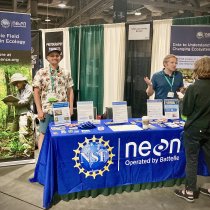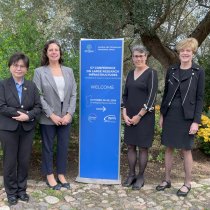Ecological Forecasting: Reducing the Timescale from Centuries to Seasons
February 27, 2018
“The time for ecologists to start forecasting is now,” says Michael Dietze. An ecologist at Boston University, Michael is seeking to arm his peers with tools for near-term ecological forecasting, answering crucial questions such as “how will ecosystems change in the near future?” and “how do human decisions affect these outcomes?”
Michael is the lead author of a new paper, Iterative Near-Term Ecological Forecasting: Needs, Opportunities and Challenges, published in January 2018 in the Proceedings of the National Academies of Sciences (PNAS). His paper is a product of a 2016 NEON-sponsored workshop, Operationalizing Ecological Forecasting, which brought together academic and agency scientists representing a broad range of ecological disciplines.
Recently, Michael also led a workshop in February at the University of Arizona, titled Ecological Knowledge and Predictions: Integrating Across Networks and National Observatories sponsored by the NSF Office of International Science and Engineering (OISE). The workshop focused on how networks and observatories can accelerate ecological knowledge generation and predictive capacity. Workshop participants visited a nearby NEON terrestrial field site at Santa Rita Experimental Range (SRER) to better understand NEON data collection methods.
In his paper, Michael introduces an iterative method of ecological forecasting that relies on feedback from ecological observations to continually refine and update predictions. Currently, most ecological forecasts focus on changes at a centennial scale, predicting trajectories over many decades or several centuries. These long-range forecasts are illuminating but are not always helpful in making immediate decisions for ecosystem preservation or climate change mitigation. They are also difficult to test empirically since they are looking at outcomes in the far future.
Near-term ecological forecasting would provide predictions for outcomes that can be seen on a much smaller timescale, from weeks to years. These predictions will be able to be tested using data from the NEON project and other ecological observatory programs. As new data is fed into the predictive models, the models can be updated to improve the accuracy of forecasting.
As Michael explains in The Conversation, “focusing on near-term forecasts over spans of days, seasons and years will help us better understand, manage and conserve ecosystems. Developing this ability would be a win-win for both science and society.” He says open-access projects like the NEON program play a valuable role in providing large, long-term data to help advance the field of ecological forecasting. He published an ecological forecasting book and is leading a course this summer at Boston University.
You can find out more about Michael’s ongoing work on ecological forecasting at his website. Interested in the overlap between NEON and your own research? Checkout available NEON data, infrastructure and resources to support your research.
About Michael Dietze
Prof. Dietze is an Associate Professor in the Department of Earth and Environment at Boston University. His primary research area is ecological forecasting and the integration of field research and computer models. Recent work has focused on how climate change affects the terrestrial carbon cycle and biodiversity.


